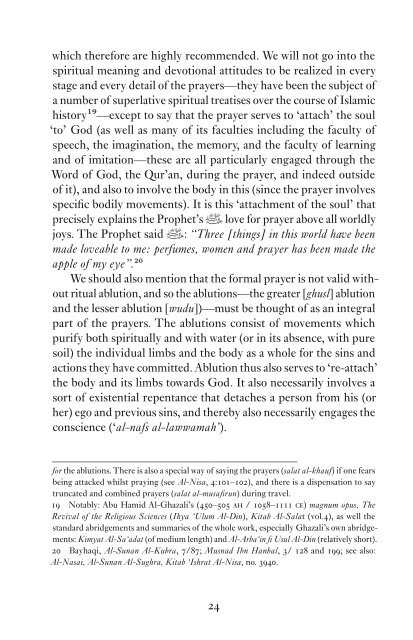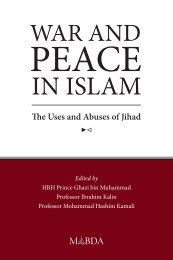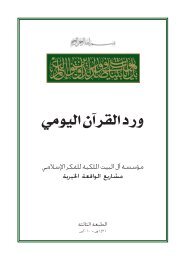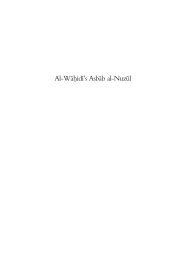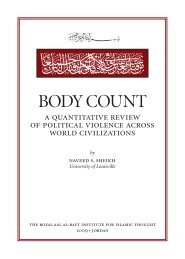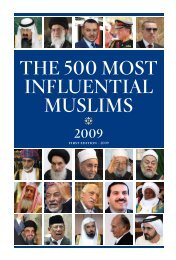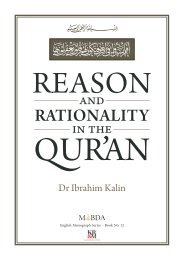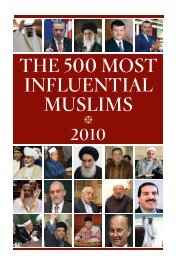You also want an ePaper? Increase the reach of your titles
YUMPU automatically turns print PDFs into web optimized ePapers that Google loves.
which therefore are highly re<strong>com</strong>mended. We will not go into the<br />
spiritual meaning and devotional attitudes to be realized in every<br />
stage and every detail of the prayers—they have been the subject of<br />
a number of superlative spiritual treatises over the course of Islamic<br />
history19—except to say that the prayer serves to ‘attach’ the soul<br />
‘to’ God (as well as many of its faculties including the faculty of<br />
speech, the imagination, the memory, and the faculty of learning<br />
and of imitation—these are all particularly engaged through the<br />
Word of God, the Qur’an, during the prayer, and indeed outside<br />
of it), and also to involve the body in this (since the prayer involves<br />
specific bodily movements). It is this ‘attachment of the soul’ that<br />
precisely explains the Prophet’s love for prayer above all worldly<br />
joys. The Prophet said : “Three [things] in this world have been<br />
made loveable to me: perfumes, women and prayer has been made the<br />
apple of my eye”.20<br />
We should also mention that the formal prayer is not valid without<br />
ritual ablution, and so the ablutions—the greater [ghusl] ablution<br />
and the lesser ablution [wudu])—must be thought of as an integral<br />
part of the prayers. The ablutions consist of movements which<br />
purify both spiritually and with water (or in its absence, with pure<br />
soil) the individual limbs and the body as a whole for the sins and<br />
actions they have <strong>com</strong>mitted. Ablution thus also serves to ‘re-attach’<br />
the body and its limbs towards God. It also necessarily involves a<br />
sort of existential repentance that detaches a person from his (or<br />
her) ego and previous sins, and thereby also necessarily engages the<br />
conscience (‘al-nafs al-lawwamah’).<br />
for the ablutions. There is also a special way of saying the prayers (salat al-khauf) if one fears<br />
being attacked whilst praying (see <strong>Al</strong>-Nisa, 4:101–102), and there is a dispensation to say<br />
truncated and <strong>com</strong>bined prayers (salat al-musafirun) during travel.<br />
19 Notably: Abu Hamid <strong>Al</strong>-Ghazali’s (450–505 ah / 1058–1111 ce) magnum opus, The<br />
Revival of the Religious Sciences (Ihya ‘Ulum <strong>Al</strong>-Din), Kitab <strong>Al</strong>-Salat (vol.4), as well the<br />
standard abridgements and summaries of the whole work, especially Ghazali’s own abridgements:<br />
Kimyat <strong>Al</strong>-Sa‘adat (of medium length) and <strong>Al</strong>-Arba‘in fi Usul <strong>Al</strong>-Din (relatively short).<br />
20 Bayhaqi, <strong>Al</strong>-Sunan <strong>Al</strong>-Kubra, 7/87; Musnad Ibn Hanbal, 3/ 128 and 199; see also:<br />
<strong>Al</strong>-Nasai, <strong>Al</strong>-Sunan <strong>Al</strong>-Sughra, Kitab ‘Ishrat <strong>Al</strong>-Nisa, no. 3940.<br />
24


